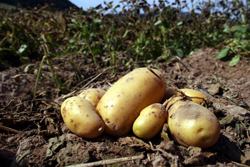Increased protein, methionine and starch in potatoes
Potatoes are a major crop in the European Union. Furthermore, research carried out into potatoes can be readily applied to other crops. Plant scientists from the OPTI-2 project investigated ways of increasing protein, methionine and starch levels in potatoes. Methionine is an essential amino acid which cannot be synthesised by animals and therefore must be gained through the diet. The consortium also studied how to reduce the level of poisonous glycoalkaloids in the crop. The overarching goal of the OPTI-2 project was to enhance free and bound amino acids and improve the nutritional value of potatoes as a food or raw feed material. A team of researchers from the Institute of Biochemistry and Molecular Biology at the University of Wroclaw undertook an analysis of messenger RNA (mRNA) in transgenic potatoes. Expression studies were performed to determine the function of 14-3-3 protein isoforms. Transgenic plants underexpressing this important regulatory protein were analysed for yield and a number of factors relating to nutritional value. Their findings showed that there was increase in the size and fresh weight of tubers, but a reduction in the number produced. In addition, it was observed that those plants which repressed the expression of 14-3-3 had an increase in activity of the enzyme nitrate reductase (NR). This was reflected in reduced levels of nitrate and an increase in the protein content. The OPTI-2 team also noted a significant increase in the activity of the enzymes sucrose phosphate synthase and starch synthase accompanied by respective changes in sucrose and starch levels. These findings were contrasted by decreased levels of certain physiologically active molecules. These included the key enzymes necessary for the metabolism of tyrosine, a non-essential amino acid involved in the synthesis of proteins. This caused a decrease in the catecholamine content of the tubers, which in turn could be responsible for the increase of starch in the transgenic potatoes. Researchers also discovered a significant increase in ethylene content, which was mirrored by a rise in the level of the essential amino acid methionine. This increase in level of ethylene could explain why the vegetative period of the analysed transgenic potatoes was considerably shortened.







